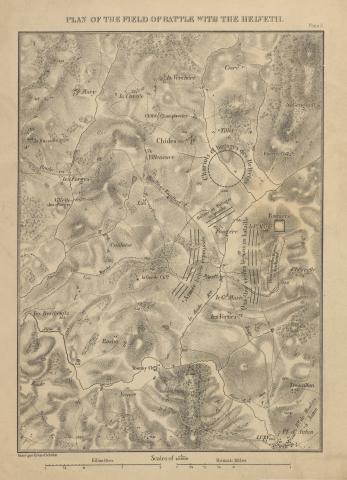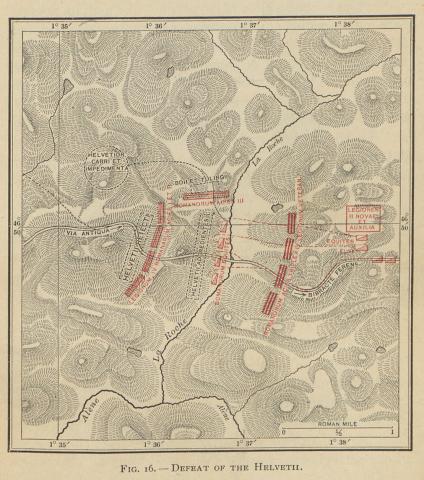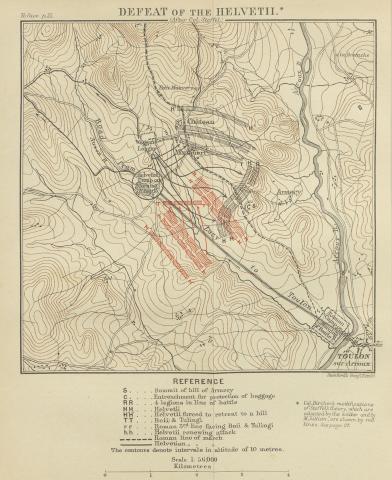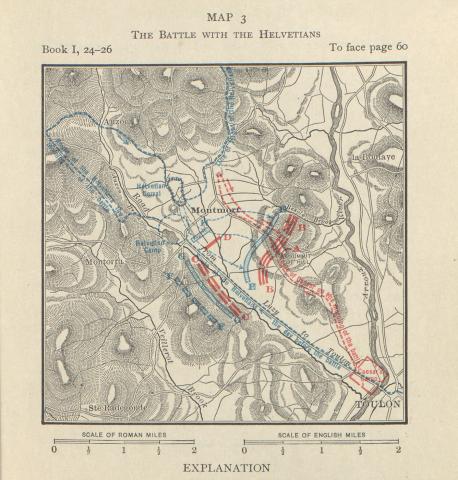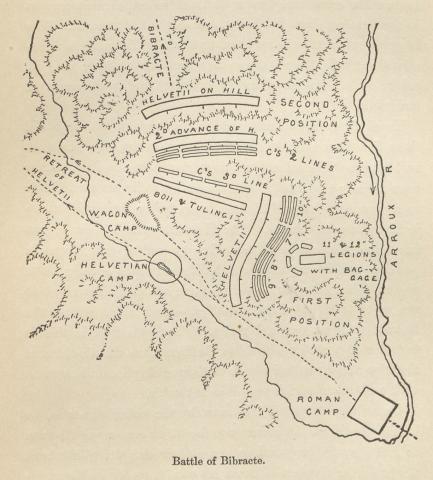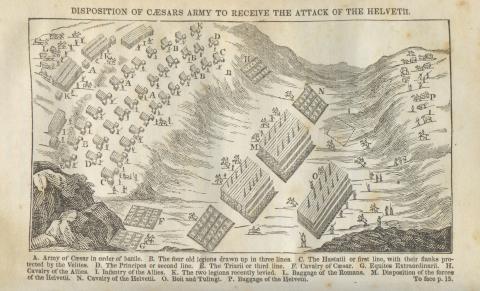Romans and Helvetians prepare for battle, the Romans on sloping ground. The Helvetians advance.
id animum advertit: = vertit animum ad id, the same as animadvertit (tmesis) (Anthon); id depends on ad in advertit (Spencer); only the neuter pronoun may be so used (Walpole): “he turned his attention to this”; “he noticed this” (Hodges); “he observed this” (H-T). The tense of the verb is perfect, as is usual after postquam (A-G), where in English a pluperfect would be more usual (M-T).
cōpiās: i.e., “the infantry force,” as distinct from equitātus (M-T).
Caesar: in a rather unusual place, not first in the sentence (Walpole).
proximum collem: thought to be the hill of Armecy, about 16 English miles southeast of Mt. Beuvray, the site of ancient Bibracte (Kelsey), near Toulon (L-E).
quī sustinēret: “to check” temporarily the skirmishers of the enemy and give Caesar time to form his lines (Walker). Subjunctive in a relative purpose clause (AG 531.2) (A-G).
ipse: = Caesar; do not translate by the cumbersome “he himself.” The pronoun serves to distinguish Caesar from the cavalry, which he had sent elsewhere (H-T).
interim: “meanwhile,” while the cavalry were holding back the enemy; it must have taken Caesar at least two hours to change over his marching column, which was five or six miles long, into battle lines (Kelsey).
in colle mediō … instruxit: “halfway up the hill he drew up … ” (Hodges); i.e., he drew up his four veteran legions on the slope of the hill, in three lines; and then placed above them, on the top of the hill, the two new legions, on whom, as consisting of recent levies, he could less safely rely; and along with these last he stationed also the auxiliary forces (Anthon).
triplicem aciem: “a triple line of battle,” i.e., the army was arranged in three lines. Each legion consisted of ten cohorts, which, in the triplex aciēs, were arranged with intervals between them: four cohorts form the first or front line, three the second, and three the third, and the cohorts in the second line are directly behind the intervals in the first (Anthon). The triple line was not straight, but followed the contour of the hillside, and was about an English mile in length (Kelsey).
legiōnum quattuor veterānārum: “[consisting] of four veteran legions” (L-E); genitive of substance / material (AG 344) describing the make-up of the aciem. Four legions, numbered VII-X (Hodges) allotted to Caesar by the senate (M-T), stood side by side, each in three lines (A-G). These legions were the ones which Caesar found in Transalpine Gaul, and the three which he brought from their quarters near Aquileia (Walker).
in summō iugō: “on the very summit”; iugum, a distinction from mōns, a mountain or hill, often denotes the summit of a hill, or the ridge of a range of hills (Anthon).
duās legiōnēs … proximē cōnscrīpserat: “the two legions which he had very recently enlisted” (Walpole). These new legions (the 11th and 12th (Kelsey)) last raised (see 1.10) were untried troops not as yet sufficiently steady to bear the brunt of a battle, and so they were set to guard the camp (A-G).
auxilia: Caesar never expected much of his Gallic infantry (Walker).
hominibus complēri: hominibus is ablative with complēri, a verb of filling, abounding (AG 409 a). By occupying the gently rounding crest of the hill, Caesar strengthened his position in case his battle lines, posted halfway up the slope, should be forced back (Kelsey).
sarcinās: The “packs” or “kits” (corresponding to our knapsacks (Stock)), carried by the soldiers, often very heavy (Hodges). In a regular battle these were left behind in camp. So here, they were deposited in one spot, which was to be the site of the camp when made by the less trustworthy troops (A-G).
et eum … iussit: eum = illum locum (A-G): “and ordered this place to be guarded by those who stood posted in the upper line.” The reference is to those on the top of the hill. Eum (locum) means the place in which the baggage was (Anthon).
ab iīs: the two raw legions and the auxilia, who were on the top of the hill (Hodges).
cōnstiterant: “were stationed” (A-G), referring to the two new legions (Walker).
mūnīrī: “to be fortified,” by a trench and a rampart formed from the earth thrown out of the trench. The trench, which for a part of the distance was double, has been traced by excavations: the earthen rampart has disappeared (Kelsey). The location of the battlefield was long uncertain, but in 1886 excavations were made on one of the proposed locations, and evidences of a semi-circular wall and ditch were found on the top of a hill. Three years later nine trenches were found in which the dead had been buried (Walker).
cum omnibus suīs carrīs: i.e., not sending merely a force of fighting men, but following with their whole train. It seems to have been the habit of these peoples to go to battle with their families and their carts for encouragement as well as for defence (A-G). The Celtic wagon had two disc-like wheels and no springs (L-E).
impedimenta: “heavy baggage,” carried on beasts of burden or wagons (L-E). After the Helvetian fighting men turned back in order to attack Caesar, the long line of carts turned and came back also and formed a great corral (Kelsey).
in ūnum locum: bits of Gallic pottery have been found there (Walker).
ipsī: i.e., the fighting men, as distinguished from the old men, women, and children with the baggage (Kelsey).
cōnfertissimā aciē: “in very close array” (Anthon); “by (their) very close formation” (Kelsey); “by the great density of their line,” literally, “by their very dense line”; ablative of means (AG 409) with rēiectō (Hodges). Confertus is properly the participle of conferciō, but is here used as an adjective (M-T).
reiectō nostrō equitātū, phalange factā: “hurled back our infantry and formed a phalanx” (Kelsey); Caesar very frequently puts two ablatives absolute together without a conjunction, of which the former gives the circumstances, time, or cause of the action expressed by the latter. Here the phalanx was formed on the repulse of the cavalry (M-T). The ancient cavalry were no match for any considerable number of foot-soldiers, and hence were not depended upon for the main engagement. They opened the fight, but were expected to flee as soon as the foot soldiers advanced (A-G).
phalange factā: phalanx is a Greek word, used to describe the compact order of the Gauls (H-T). The Macedonian phalanx, so celebrated in ancient warfare, was doubtless unknown to the Gauls. The Helvetic phalanx, here referred to, was probably similar to the German, which consisted simply of a body of soldiers in close array, under the cover of their shields close-locked over their heads (Harkness), resembling the testūdō of the Romans (Anthon). The Gauls, forming in “a compact mass,” probably fifteen to twenty men deep, moved forward slowly but with almost irresistible momentum; those in the front rank held their large shields so that these would overlap, like the tiles of a roof (L-E), presenting a firm barrier to the enemy (Kelsey).
sub prīmam nostram aciem successērunt: “came up close to our front line” (Anthon); “pressed forward to … ” (Kelsey). The “first line” is actually the lowest or front line to an approaching enemy (Harkness). Sub (also in, subter, super) is followed by the accusative with a verb of motion (L-E).

